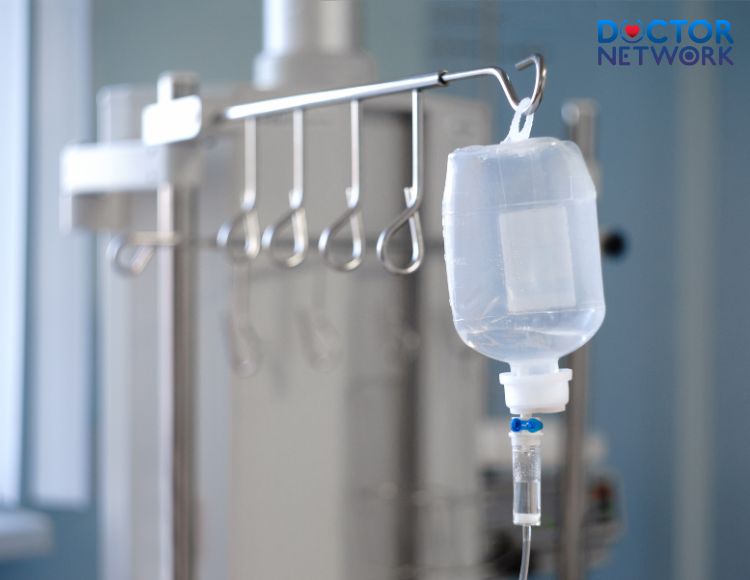Intravenous fluid therapy, or IV fluid administration, is a technique of delivering solutions directly into the veins. This simple procedure holds particular importance in treating dehydration, electrolyte imbalances, aiding in recovery, and overall health restoration. What are the specific benefits of intravenous fluid therapy?
Benefits of Intravenous Fluid Therapy
Rehydration and Electrolyte Replacement: Our bodies require a stable amount of water and electrolytes (such as sodium, potassium, chloride, etc.). Conditions like diarrhea, vomiting, high fever, burns, and surgery can lead to significant losses of water and electrolytes. IV fluid therapy helps replenish these deficits, with 0.9% saline solution (NaCl) being especially effective in restoring body balance.

What effect does seawater infusion have? – Replenish water and electrolytes
Nutrient Supply: In severe cases of weakness, doctors may prescribe IV fluids containing glucose, proteins, and vitamins to provide energy support for the patient.
Medical Treatment Support: IV fluid therapy helps dilute and rapidly eliminate toxins in cases of poisoning. It is also used to administer medications, such as antibiotics, to patients with infections.
Situations Requiring IV Fluid Therapy
According to medical guidelines, IV fluid therapy is indicated in cases of:
Moderate to Severe Dehydration: Indicated by symptoms such as intense thirst, reduced urine output, dark-colored urine, dry skin, dizziness, etc.
Hypovolemic Shock: Due to blood loss or severe burns.
Poisoning: To aid in toxin elimination.
Pre/Post-Surgery: For fluid replacement and hemorrhage control.
Severe Weakness: Inability to eat or drink for extended periods.

Not being able to eat or drink for a long time is a sign that you need an immediate intravenous fluid infusion
Precautions for IV Fluid Therapy
Do Not Self-Administer at Home: The process requires absolute sterility and monitoring to promptly address any adverse reactions. Self-administration can lead to severe complications like anaphylactic shock, infections, and pulmonary edema, which can be life-threatening.
Risks of IV Fluid Therapy: Allergic reactions to the fluid components, circulatory overload (especially in patients with heart or kidney conditions), and infections at the injection site.

Allergies to infusion fluid components, circulatory overload,… are risks when infusing sea water
High-Risk Patients: Patients with cardiovascular diseases, renal failure, or liver failure need strict monitoring by a physician during IV fluid therapy.
Common Questions About the Benefits of Intravenous Fluid Therapy
Here are five common questions related to the topic “What are the benefits of intravenous fluid therapy?”:
Should I get an IV drip for fatigue?
Answer: Ordinary fatigue from overwork or lack of sleep can be improved with rest and proper nutrition. IV fluid therapy is indicated only if fatigue is due to severe dehydration, electrolyte imbalance, or an underlying condition. Consult a doctor to determine the cause and appropriate treatment.
Does IV fluid therapy help with weight loss?
Answer: IV fluid therapy does not directly aid in weight loss. It helps replenish fluids and electrolytes, which may support metabolism but does not burn fat. Safe and effective weight loss requires a combination of a healthy diet and regular exercise.
Do children with diarrhea need IV fluids?
Answer: Diarrhea can cause rapid dehydration in children, which can be fatal. If a child shows signs of dehydration (excessive thirst, reduced urine output, sunken eyes), seek medical attention immediately. A doctor will assess the dehydration level and may recommend IV fluids, alongside oral rehydration solutions (ORS).
How soon will I feel better after an IV drip?
Answer: Recovery time after an IV drip depends on the underlying cause and the individual’s condition. Simple dehydration or electrolyte imbalance may see quick improvement within a few hours. For other medical conditions, IV fluids support treatment, and recovery time may vary.
How much does IV fluid therapy cost?
Answer: The cost of IV fluid therapy varies by medical facility and the type of fluid used. Typically, one IV fluid bag in a hospital costs between several tens to over a hundred thousand VND. Additional costs include service fees and medical supplies. It’s advisable to check prices beforehand.
Scientific Evidence on Benefits of Intravenous Fluid Therapy
- Study: “Intravenous fluid therapy for dehydration in adults” (2016) in the Cochrane Library confirms the effectiveness of 0.9% NaCl solution in rehydrating and replenishing electrolytes in dehydrated adults.
- Document: “Oral Rehydration Solutions for Children” (2023) by WHO recommends oral rehydration solutions (ORS) for children with diarrhea. In severe dehydration, IV fluids are prioritized.
- Study: “Intravenous nutrition for critically ill patients” (2018) in Critical Care Medicine demonstrates the efficacy of IV nutritional solutions in providing energy and protein to severely malnourished patients.
- Document: “Malnutrition in hospitalized patients: A review of its prevalence and consequences” (2019) in Nutrition Reviews highlights the role of IV nutritional therapy in improving nutritional status and supporting treatment in patients.
- Study: “Intravenous fluids for sepsis: Current evidence and future directions” (2020) in Intensive Care Medicine shows IV fluids’ effectiveness in improving blood pressure and reducing mortality risk in septic patients.
- Document: “Intravenous antimicrobial therapy for severe infections” (2021) by the CDC recommends IV antibiotics for severe infections.
Conclusion
Intravenous fluid therapy is a crucial medical technique that offers numerous benefits in emergency care and treatment. However, it should only be administered under a doctor’s supervision to avoid complications. This article aims to provide comprehensive knowledge on the benefits of intravenous fluid therapy.
References:
https://www.mdpi.com/2072-6643/12/9/2646
https://www.ncbi.nlm.nih.gov/pmc/articles/PMC9657671/
https://www.mdpi.com/2072-6643/14/3/581
Kiểm Duyệt Nội Dung
More than 10 years of marketing communications experience in the medical and health field.
Successfully deployed marketing communication activities, content development and social networking channels for hospital partners, clinics, doctors and medical professionals across the country.
More than 6 years of experience in organizing and producing leading prestigious medical programs in Vietnam, in collaboration with Ho Chi Minh City Television (HTV). Typical programs include Nhật Ký Blouse Trắng, Bác Sĩ Nói Gì, Alo Bác Sĩ Nghe, Nhật Ký Hạnh Phúc, Vui Khỏe Cùng Con, Bác Sỹ Mẹ, v.v.
Comprehensive cooperation with hundreds of hospitals and clinics, thousands of doctors and medical experts to join hands in building a medical content and service platform on the Doctor Network application.































